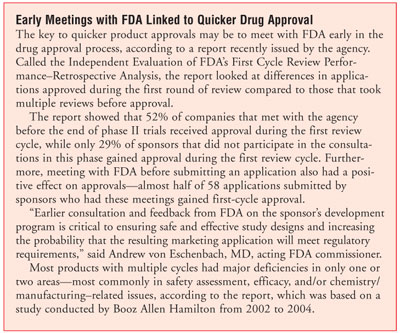US
Pharm. 2006;4:52.
Tysabri Studies Allowed
to Proceed
The FDA has
removed a hold on clinical trials of Biogen IDEC and Elan's Tysabri
(natalizumab) in patients with multiple sclerosis (MS). Biogen IDEC had
suspended marketing and clinical trials of the drug in February 2005 after
three patients, two taking the drug for MS and one for Crohn's disease,
developed progressive multifocal leukoencephalopathy (PML).
Patients with MS who had
previously received the drug under an investigational study may now resume use
following a discussion with their physician about its risks and benefits. FDA
noted in a press release that natalizumab has shown benefit in patients with
relapsing-remitting MS, although the agency remains concerned about its
association with PML, which led to the death of two of the patients who had
developed the frequently fatal brain infection.
FDA has scheduled an
Advisory Committee Meeting for early March to discuss an application for
Tysabri, which has not been allowed to return to market.

Tequin Labeling Revised
Product labeling
for Bristol-Myers Squibb's Tequin (gatifloxacin) now contains stronger
warnings about the drug's association with hypoglycemia and hyperglycemia, FDA
reported. Additionally, the labeling has a contraindication for using the drug
in patients with diabetes, as well as information on risk factors for high and
low blood sugar. Since the antibiotic's approval in 1999, there have been rare
cases of life-threatening--fatal, in some instances--events reported globally.
Trasylol Linked to
Serious Side Effects
Bayer's Trasylol
(aprotinin injection), a drug used to prevent blood loss during surgery, may
increase risks of serious side effects in patients who undergo artery bypass
graft surgery, according to an FDA Public Health Advisory issued in February.
The agency specified that
physicians should monitor patients for toxicity, particularly to the kidneys,
heart, or central nervous system, and report adverse events to Bayer or FDA's
MedWatch program. Additionally, physicians should consider limiting use of the
drug to situations in which reducing blood loss is essential to medical
management; they should also discuss major risks of heart bypass surgery with
patients.
FDA is continuing to
evaluate the safety of the drug to determine whether labeling changes or other
actions are warranted. A report in the New England Journal of Medicine linked
Trasylol to higher rates of serious kidney problems, heart attack, and stroke,
compared to treatment with other drugs to prevent bleeding or to no treatment,
while a Transfusion study found that the drug was associated with more cases
of decreased kidney function compared to another treatment to prevent bleeding.
--Abigail Brugger
To comment on this article, contact editor@uspharmacist.com






